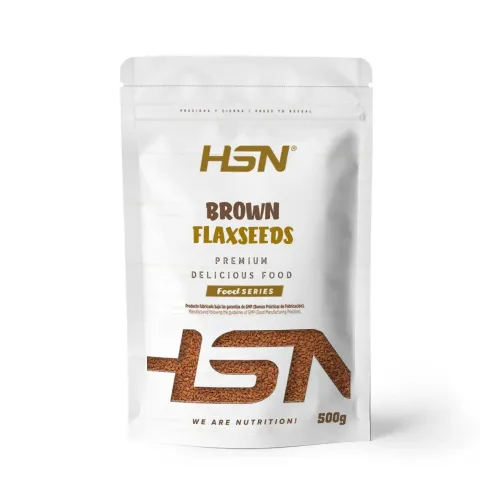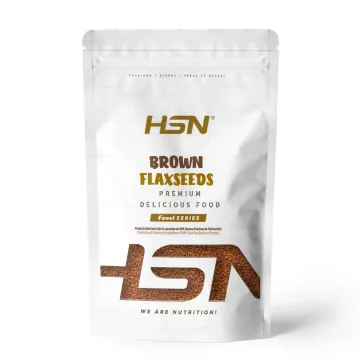- Delicious brown flaxseeds: Enjoy genuine natural brown flax with no added ingredients of any kind.
- High natural fibre content: Brown flax contains 27% of its nutritional composition in fibre, including both soluble and insoluble fibre.
- Supports cholesterol levels: Alpha-linolenic acid, which is found in brown flaxseeds, helps maintain normal blood cholesterol levels 1.
- 20% Protein: A quality source of plant-based protein. Add flax to your recipes to enhance their nutritional profile.
- High magnesium content: Brown flaxseeds are an excellent natural source of magnesium, an essential mineral for your nervous system and muscles.
Brown flaxseeds – Take care of yourself the easy way
Brown Flaxseeds from FoodSeries are a natural food made exclusively from the seeds of the Linum usitatissimum plant, also known as linseed.
Flax is an ancient plant native to the Fertile Crescent region in the Middle East and has been cultivated for over 7,000 years, especially for its highly nutritious seeds. Ancient civilisations, such as the Egyptians, used them for food purposes. Today, flaxseeds (also known as linseed) are valued as a top-quality food due to their high content of plant-based omega-3, fibre, and essential nutrients. An interesting fact is that flax was one of the first plants to be domesticated by humans, and its oil (linseed oil) is a by-product of the seed that has enormous value in international cuisine.
Brown flax is the type of flax with the most distinctive flavour and richest nutritional value.
Genuine high-fibre linseed for your diet
100% natural. No additives of any kind
Our brown flaxseeds are 100% natural, with no additives, preservatives, or added ingredients. This means we guarantee not only a more nutritious product, but also better suitability for all dietary requirements. Since they haven't been refined or blended, our flaxseeds retain all their natural properties intact.
Thanks to their 100% plant-based and allergen-free origin, both naturally and from cross-contamination, our brown flax is suitable for all types of dietary preferences: it's ideal for vegan, paleo, and keto diets, and contains no gluten, dairy, soya, nuts, or other allergens. This makes it a versatile and safe option, even for people with food sensitivities.
If you're looking for 100% natural, additive-free, allergen-free linseed, you've just found it!
High in essential Omega-3 fatty acids. 20% ALA
In the modern Western diet, omega fatty acid intake is often inadequate, especially in relation to omega-3s, which can be problematic. The insufficient consumption of omega-3 has been studied in recent years by scientists, as it is considered a real public health issue caused by poor nutritional education. This is mainly due to excessive consumption of refined vegetable oils, ultra-processed foods, and low intake of natural omega-3 sources.
In this context, including plant-based omega-3 sources becomes essential, especially for those following vegan diets. In this regard, linseed (brown flax) stands out as one of the richest sources of alpha-linolenic acid (ALA), the type of omega-3 found in plants. This essential fatty acid is the starting point for the conversion into other, more complex omega-3s such as EPA and DHA in the human body. Adding linseed to your daily diet is a practical and natural way to bridge this nutritional gap and support your health from within.
Brown flaxseeds are rich in alpha-linolenic acid, which also helps maintain normal blood cholesterol levels1
Great protein source to enrich your diet
In diets like vegan or vegetarian ones, where traditional sources of protein (such as meat, eggs, or dairy) are absent, it can be challenging to meet your daily protein requirements.
In this context, brown flaxseeds are an excellent alternative, providing around 20g of protein per 100g of product. This makes them a practical and natural ally to improve your diet. They're an excellent choice to combine with other plant foods to achieve a complete protein profile, which makes them highly valuable in diets focused on plant-based sources.
Proteins help maintain and increase muscle mass.
High fibre content: Soluble + Insoluble
Brown flaxseeds contain a high amount of dietary fibre (27g/100g), making them a natural option for boosting fibre intake in any diet.
This fibre comes in two forms: soluble and insoluble, which gives flaxseeds a unique texture and culinary versatility. When ground or soaked, they release mucilage – a gel-like substance that adds body to mixtures, which is especially useful in recipes like wholegrain breads, smoothies, or puddings.
The soluble fibre in flax dissolves in water, forming a viscous texture, ideal for moist recipes or as a natural thickener. Meanwhile, the insoluble fibre provides structure and consistency, useful in denser mixes or as an ingredient in baked goods.
This combination of fibres makes brown flax a highly interesting ingredient, both from a culinary and nutritional standpoint.
How to take brown flaxseeds for each use
Whole
Eating whole brown flaxseeds mainly provides insoluble fibre, which adds texture and bulk to meals. However, as they're covered by a tough outer shell, many of their inner nutrients – including omega-3 fatty acids – may not be fully absorbed during digestion. That’s why this format is ideal as a crunchy topping for salads, yoghurts, granola or breads, with a focus more on texture and fibre content.
Ground
Grinding flaxseeds breaks the cell walls, allowing better digestion and absorption of their bioactive compounds, especially omega-3s (ALA). Ideally, grind them just before consuming, as their essential oils can oxidise over time if exposed to air. Ground seeds easily blend into smoothies, doughs, soups, porridge, pancakes, or even as part of mixtures for veggie burgers.
Soaked
When soaked in water, flaxseeds form a mucilaginous gel thanks to their soluble fibre. This gel is useful in both cooking and functional nutrition: it’s commonly used as an egg substitute in vegan recipes (1 tablespoon of ground flax + 3 tablespoons of water equals 1 “egg”), or to make puddings like chia pudding, thick fruit smoothies or blends with other seeds such as chia, or with psyllium husk. Its soft, jelly-like texture is highly appreciated in both sweet and savoury recipes.
Brown flax vs Golden flax. Which one to choose?
Both brown and golden flax belong to the same species (Linum usitatissimum) and share most of their nutritional properties. Both are excellent sources of plant-based omega-3 (ALA), fibre, and plant proteins. However, they differ slightly in flavour, appearance, and culinary use, which may influence your choice depending on your goal or recipe type. At HSN, we provide all the information you need to make a conscious purchase:
| Characteristic | Brown Flax | Golden Flax |
| Colour | Dark brown | Golden |
| Flavour | More intense | Milder |
| Nutritional content | Rich in fibre, protein and omega-3 | Rich in fibre, protein and omega-3 |
| Culinary use | Wholegrain bread, biscuits, crunchy topping | Baking, smooth blends, puddings |
Enjoy flax and other healthy foods from HSN: Here.
Bibliographic references
- Nowak, W., & Jeziorek, M. (2023). The Role of Flaxseed in Improving Human Health. Healthcare (Switzerland), 11(3).
- Machado, A. M., de Paula, H., Cardoso, L. D., & Costa, N. M. B. (2015). Effects of brown and golden flaxseed...
- Parikh, M., Maddaford, T. G., Austria, J. A., Aliani, M., Netticadan, T., & Pierce, G. N. (2019). Dietary flaxseed as a strategy for improving human health. Nutrients, 11(5).
- Sant’Ana, C. T., et al. (2022). Brown and golden flaxseed reduce intestinal permeability.... International Journal of Food Sciences and Nutrition, 73(6), 829–840.
- Kajla, P., Sharma, A., & Sood, D. R. (2015). Flaxseed - a potential functional food source. Journal of Food Science and Technology, 52(4), 1857–1871.
1 The beneficial effect is obtained with a daily intake of 2g of this fatty acid.
 Before
Before After
After During
During Morning
Morning Afternoon
Afternoon Night
Night Before
Before After
After During
During Morning
Morning Afternoon
Afternoon Night
Night











